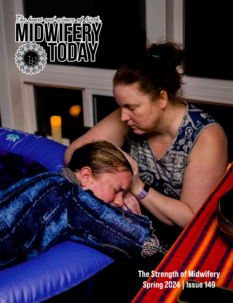
Child Is Father to the Man: A Survivor of Childhood Sexual Abuse Speaks Out
Editor’s note: This article first appeared in Midwifery Today, Issue 51, Autumn 1999 and Midwifery Today Issue 90 Summer 2009.
Subscribe to Midwifery Today Magazine
I had not known that the effects of my childhood sexual abuse would continue to haunt me throughout adolescence and into adulthood, eventually taking me to face it head on at the birth of my firstborn.
Although I considered looking at the issue of such abuse from a clinical viewpoint, after battling with my feelings I decided to share my personal experience of how such abuse can affect men in later life, particularly around parenthood. Therefore, I offer the story of my life not as a legal analysis or treatment model but as a way of preparing midwives for some of the difficulties you may be confronted with while working with parents when the father is a survivor of childhood sexual abuse. I also want to offer some suggestions as to how I might have benefited from advice or intervention from the professionals involved in my wife’s pregnancy in the ante- and postnatal stages and who, I believe, noticed I was having difficulty.
The first time I realised the enormity of my childhood sexual abuse was on receiving the news that I was about to become a father. I had successfully avoided the subject of parenthood throughout my courtship and subsequent marriage to my childhood sweetheart. A determined career man, I thought children would deny me the opportunity to succeed. I had made many attempts to give countless reasons why not having children was preferable to having a family. This “great expectation” filled me with dread and plunged me into months of despair and depression for which there appeared neither apparent reason nor any relief. The psychological harm and emotional consequences repressed since the abuse were beginning to emerge.
When my wife told me she was pregnant my immediate thoughts were of termination. How would I cope with the added responsibility of another mouth to feed? The expectations of fatherhood terrified me. I had never experienced men in a caring role, so how would I care for and raise my own son? I had presented myself to everyone as a man capable of doing anything he set his mind to. I was in control of my life and had everything I needed, a good home, a good job, a good wife–everything. Life was perfect. We were the perfect couple. But I had no idea how to manage fatherhood, and if I was going to do it, then it had to be perfect.
Soon after my son was born I packed my bags and left home. I was experiencing flashbacks of myself as a young boy. I felt alone in a house full of baby admirers. I took flight instead of staying to fight. I should have been overjoyed, yet I abandoned my family–in the same way my own father had abandoned my mother and me–in an attempt to establish a reason behind these strange feelings. Why did I not want this “bundle of joy,” this “gift from God,” these “precious little reminders of my own abuse”?
I soon returned home, wracked with guilt and a reinforced sense of failure, to fulfill my responsibilities as a caring parent. We managed, though only just. I knew I was changing and my wife believed another child might help. However, after my daughter was born life became intolerable and unbearable. I was confused about my own identity now and was keen to be back in the family role I had held when it was just my wife and me. I wanted to be the child again. I wanted some love and affection. I felt rejected, second to the children and no longer important to my wife. Although I had always been determined to be a faithful husband to my wife and good father to my children, I was terrified.
Nonetheless, I was determined that my marriage would work. I was going to be the one to break the cycle of abuse. I knew I could cope. I had to, after all. I was a survivor.
My own mother had been unable to show love to us but focused more on her work and codependent relationships. Her longest marriage, one of several, was to a man who systematically beat me to the screams of my mother pleading with him to stop. Often she would shield me from his blows but was hurt in the process. I would never do that, I had told myself. I would never hit a woman. Another of her men was an abusive alcoholic who scared me rigid.
I had kept my abuse a secret, sharing it only once with a man I considered a friend who then took advantage in the same way. When I had disclosed to my mother she had not believed me and accused me of spreading malicious gossip to end her relationship. She always reinforced my feeling of being second best, yet I always felt more at ease discussing personal issues with a woman, feeling less threatened than I would with a man.
The abuse had begun when I was less than five years old and continued until I was 15. Not with one familiar abuser, a friend of the family, but with others, too. Relative strangers, acquaintances and later, a stepfather, had continuously sought me out as someone who was needy. Even the head boy at school had a go. These were people I had been brought up to respect and trust. They had seen how I was desperate for love and attention and they had targeted me. They had watched and waited, patiently grooming me until they had gained my trust and then they gave me what I needed, a hug and some love. Of course I didn’t resist because this felt right, yet I’ve learned since how it was so wrong. I had been vulnerable and felt overwhelmed by this new affection. My rights of childhood had been taken away, my boundaries broken.
After the birth of my children I was forced to reflect on my childhood, which started the process of painful realisation that my memory of the abuse was not going away. My relationship with my wife began to get worse. After several months of psychotherapy, which was unable to uncover these hidden feelings, I took a massive drug overdose and ended up in an intensive care unit of the local hospital on a life support machine.
I was discharged to the psychiatric hospital secure unit–locked up. Locked up alone with the memories of how I had become a victim of sexual abuse, of a child desperate for love from his mother and a father he could respect. What had been allowed to happen to me had left me scarred and insecure. I could not trust anyone. My mother had abandoned me for other men several times. My wife was rejecting me for our children, and all my childhood fears of loneliness had come flooding back. The birth of my children had opened up a Pandora’s Box and there was no place to hide now.
Because those who abused me were adult males who played a significant role in my life, I felt confused. I was in a dilemma because my abuse had left me not knowing the difference between what was honest, nurturing love and care and what was invasive, inappropriate and abusive.
While struggling to get close to my own children, I was terrified that any touch could be seen as sexual. Often I’d heard that survivors of abuse went on to perpetrate abuse on others. I lived in fear that I might have the capacity to do this. Even changing a nappy left me filled with guilt and shame though I had done nothing. Nothing. I often avoided my infant son. I isolated. I detached from my family to protect them from me and to protect myself from them. In doing so, I was told that I did not care. I became moody and quiet and nobody noticed. Well, some people noticed and said I was “attention-seeking”! Everyone was wrapped up in the “new boy.” Except for me. I was no longer wrapped up but instead, left naked with my memories rekindled, raw and open.
As a result of the behaviour that followed I went on to lose all that I’d achieved. Everything I had striven for slipped through my fingers. I began a life filled with depression, drug abuse and self-loathing.
In order to escape the feelings evoked by the birth of my son I began to use drugs to change the way I felt. First it was prescription drugs but soon I found cocaine. This became my blanket. This drug wrapped around me like the hug I needed. I based my relationships on other people’s needs rather than my own and detached completely from my family, believing I was not worthy of them. I engaged in abusive relationships and experimented with homosexuality as a way of avoiding the failure of my own marriage and any requirement to father more children. I began to work as a male prostitute, allowing myself to become further abused, yet somehow maintaining an element of control. I was in fact losing control.
I had lost my job as a policeman, the very career I had used as a mask to hide behind. I lost my home. I lost my wife and my children to my best friend. The birth of my son had left me feeling betrayed, hurt and abandoned. I felt a failure. I had been the one who wanted to do the “father thing” perfectly and break the chain of abuse, and here I was sabotaging any chance of reconciliation with my wife or children. What sort of role model was I?
Finally, I realised that I was killing myself through drug and alcohol abuse and self-neglect. I hated myself for what I had done to my family and for abandoning my wife and children. I wanted desperately to be in touch with them, but to avoid the pain of my own abuse I “let them go.” I agreed that I would have only written and telephone communication with them, but my self-destructive behaviour soon stopped even that. I longed for the day when my son and daughter might contact me just to say, “It’s okay, Dad. It wasn’t your fault.” But while I continued to destroy myself there was no hope for this.
Instead, I found recovery. I began to find ways to survive and rebuild my life. I became a rescuer of others and started work in the caring profession following the experience and success of my own personal therapy. I began to grow up. I allowed the child within me to feel the feelings, identify them, accept them and work through them, moving on to counsel others with similar stories.
As a survivor I learned to identify how my abuse had changed my perceptions of others, my expectations of myself and my interactions within relationships. I had not told my wife of the abuse for fear that she would not believe me, just as my own mother had done when I had tried to tell her. I believed my wife would reject me. I had repressed the memories in order to survive the loss, pain and hurt, and I had attempted to forget. But the man who has survived still has flashbacks. I still grieve the loss of my own childhood, the loss of my children, my wife and my dreams of having the perfect family–the cycle of abuse having been broken just that little too late.
By letting you know about my pain, I hope that support for the fathers will be recognised as a real need. Too often they get left in the dark with their own fears of parenting, and the focus remains with the mother and newborn child. Had a professional involved at the time been aware of some of the symptoms that might be experienced by a survivor at the birth of a child, then maybe I could have been directed to a relevant agency where I could have sought help. Had I known that other men who had been abused went through similar challenges and that I was not alone with the feelings, I may have been able to survive this struggle, too. My very own child had plunged me back into my childhood. A childhood that was abusive will take years to repair. By allowing men an opportunity to talk about the abuse, the process of healing can begin. I existed in the darkness of my own secrets and shame. The birth of my son made me open my eyes. Now that I have moved out of the darkness, I have new people, new opportunities and a new beginning.
Seeking Contributors: Research Project
Derek Lainsbury is conducting narrative research into the effects of childhood sexual abuse on fathers when they are confronted with the birth of their own child(ren). He would like to hear stories—both negative and positive—from fathers who have been affected—emotionally, psychologically, physically and /or spiritually.
If you are a father and would like to contribute to the research, please send an e-mail to Derek with a short summary of your personal experience. He can’t guarantee that your story will be included in the research, but in every case Derek will respond to you and acknowledge your contribution.
If your story is considered for use in this important research project, Derek will conduct a more detailed interview. E-mail: [email protected]


















